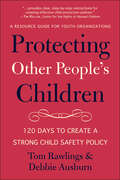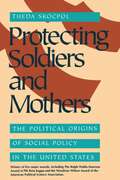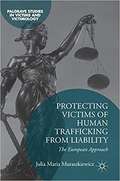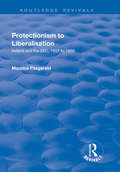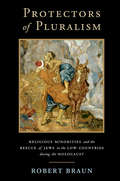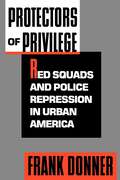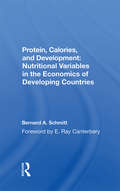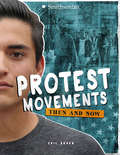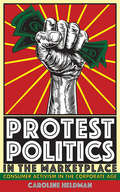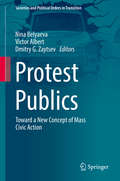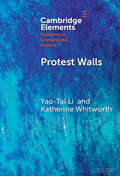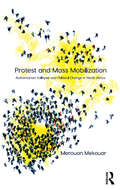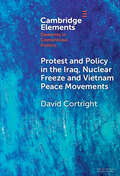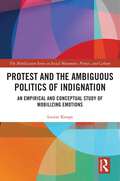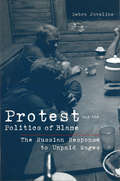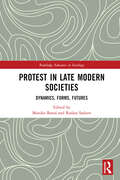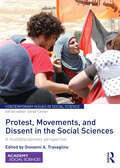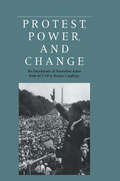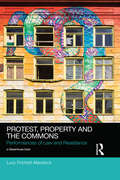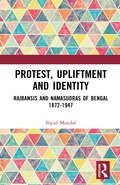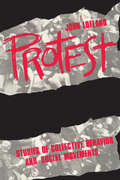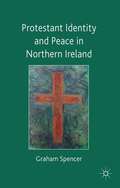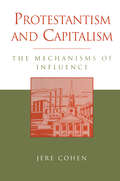- Table View
- List View
Protecting Other People's Children: 120 Days to a Strong Child Safety Policy
by Debbie Ausburn Tom RawlingsA one-of-a-kind guide for youth-serving organizations to help build out their own child protection policies in just 120 days.Expert guidance, worksheets, and checklists take the guesswork out of confusing industry standards—so you can focus on helping kids learn, grow, and flourish.Written by two legal experts with more than 60 years of experience helping youth-serving organizations (YSOs), Protecting Other People's Children provides a blueprint for organizations to develop their own child safety policies.From private schools to church youth groups to mentoring organizations to summer camps, YSOs provide unparalleled opportunities for children to learn, grow, and flourish. Unfortunately, because they serve a vulnerable population, those groups also face unparalleled risks.With Protecting Other People's Children, organizations will be able to: Recognize and avoid common pitfalls and mistakes Set up a workable timeline for implementationCreate and confirm their own commitments and principlesAccess several supportive worksheets, checklists, and activity guidesLearn how to pick the right people (leaders, team, volunteers, etc.)Understand and adhere important protocols and guidelinesAppropriately respond to serious incidentsProtecting Other People's Children enables YSOs to develop robust, sustainable child protection plans, holding everyone accountable while protecting both the programs and the minors they serve.
Protecting Soldiers And Mothers: The Political Origins Of Social Policy In The United States
by Theda SkocpolIt is a commonplace that the United States lagged behind the countries of Western Europe in developing modern social policies. But, as Theda Skocpol shows in this startlingly new historical analysis, the United States actually pioneered generous social spending for many of its elderly, disabled, and dependent citizens. During the late nineteenth century, competitive party politics in American democracy led to the rapid expansion of benefits for Union Civil War veterans and their families. Some Americans hoped to expand veterans' benefits into pensions for all of the needy elderly and social insurance for workingmen and their families. But such hopes went against the logic of political reform in the Progressive Era. Generous social spending faded along with the Civil War generation. Instead, the nation nearly became a unique maternalist welfare state as the federal government and more than forty states enacted social spending, labor regulations, and health education programs to assist American mothers and children. Remarkably, as Skocpol shows, many of these policies were enacted even before American women were granted the right to vote. Banned from electoral politics, they turned their energies to creating huge, nation-spanning federations of local women's clubs, which collaborated with reform-minded professional women to spur legislative action across the country. Blending original historical research with political analysis, Skocpol shows how governmental institutions, electoral rules, political parties, and earlier public policies combined to determine both the opportunities and the limits within which social policies were devised and changed by reformers and politically active social groups over the course of the late nineteenth and early twentieth centuries. By examining afresh the institutional, cultural, and organizational forces that have shaped U.S. social policies in the past, Protecting Soldiers and Mothers challenges us to think in new ways about what might be possible in the American future.
Protecting Victims of Human Trafficking From Liability: The European Approach (Palgrave Studies in Victims and Victimology)
by Julia Maria MuraszkiewiczThis books demonstrates the difficulty of protecting victims of human trafficking from being held liable for crimes they were compelled to commit in the course, or as a consequence, of being trafficked, under current European law. The legislation remains vague and potentially inadequate to recognise victimhood, safeguard the human rights of victims, and avoid further victimisation. Wiliamson explains how the non-liability principle is rooted in criminal and human rights law, and proposes a more efficient provision and framework which would protect trafficked persons, and do better to encourage victims to act as witnesses in criminal proceedings against the perpetrators. In doing so the book will provide relevant stakeholders, including policy makers and law enforcement authorities, with a better understanding of the non-liability principle and how it ought to be used in practice.
Protectionism to Liberalisation: Ireland and the EEC, 1957 to 1966
by Maurice FitzgeraldThis title was first published in 2000. This work examines Irish government towards European integration in the second post-war decade by concentrating on crisis points or flash points, it does this in a fairly subject-oriented manner concerning Dublin's decision-making processes. The central themes of this study are concentrated on economic matters, but they deal with other tenets when relevant too, be they of a cultural, diplomatic, ideological, military, political or social nature.
Protectors of Pluralism: Religious Minorities and the Rescue of Jews in the Low Countries during the Holocaust (Cambridge Studies in Contentious Politics)
by Robert BraunProtectors of Pluralism argues that local religious minorities are more likely to save persecuted groups from purification campaigns. Robert Braun utilizes a geo-referenced dataset of Jewish evasion in the Netherlands and Belgium during the Holocaust to assess the minority hypothesis. Spatial statistics and archival work reveal that Protestants were more likely to rescue Jews in Catholic regions of the Low Countries, while Catholics facilitated evasion in Protestant areas. Post-war testimonies and secondary literature demonstrate the importance of minority groups for rescue in other countries during the Holocaust as well as other episodes of mass violence, underlining how the local position of church communities produces networks of assistance, rather than something inherent to any religion itself. This book makes an important contribution to the literature on political violence, social movements, altruism and religion, applying a range of social science methodologies and theories that shed new light on the Holocaust.
Protectors of Privilege: Red Squads and Police Repression in Urban America
by Frank DonnerThis landmark exposé of the dark history of repressive police operations in American cities offers a richly detailed account of police misconduct and violations of protected freedoms over the past century. In an incisive examination of undercover work in Chicago, Los Angeles, New York, and Philadelphia as well as Washington, D.C., Detroit, New Haven, Baltimore, and Birmingham, Donner reveals the underside of American law enforcement.
Protein, Calories, And Development: Nutritional Variables In The Economics Of Developing Countries
by Bernard SchmittProduction of world food supplies is related to more complicated socioeconomic variables than have previously been analyzed. Besides traditional inputs of land, labor, and fertilizer, the technological capabilities and a variety of nutritional and other human capital components are significant independent variables in explaining agricultural production in the developing world. The integration of economic analyses with the concepts of nutritional science offers an expanded and effective means for analyzing the complex problems of agricultural production in nutritionally deficient countries. Bernard Schmitt traces the circular relationship between nutrition and human capital, labor productivity, food production, and per capita consumption of calories and protein. He defines the basic nutritional terms that are most useful to economists in analyzing agricultural and foodrelated questions and provides examples that stress the importance of concentrating on nutritional quality as well as gross quantity. Transformations are used to convert quantities into basic nutritional components, allowing more meaningful quantitative analyses in an econometric framework. Dr. Schmitt presents a flexible methodology for forecasting commodity production, using it to make projections for the developing countries for each major commodity group and to test various policy alternatives such as extensive trade, expanded food assistance programs, substantial resource or input expansion, further expansion of Green Revolution technology, and development of alternatives to agriculture. Although he is certain that gains can be accomplished through population control and agricultural advances, supplemented by alternative nutritional sources, he concludes that conditions in nutritionally deficient countries are unlikely to improve, on average, through the mid-1980s.
Protektion 4.0: Das Digitalisierungsdilemma (Die blaue Stunde der Informatik)
by Günter MüllerDas Buch beschreibt Datenschutz erstmals als Offenheit (Transparenz) statt Datensparsamkeit. Der Autor beschreibt als Voraussetzung dazu einen Besitztitel auf Daten. Die Umsetzung erfolgt über Big Data, deren Techniken so ausgelegt sind, dass Daten zur „handelbaren“ Ware werden können, indem dokumentierbar wird, wie von wem wozu Daten verwendet worden sind. Transparente Verwendung auch in Hinsicht auf den Nutzen oder die Notwendigkeit statt Verbergen wird als neues Privatheitsmodell vorgeschlagen. Die Synchronisation der Entwicklung von Technik und Gesellschaft steht dabei im Vordergrund. Zahlreiche Fallstudien erhöhen den praktischen Nutzen des Buches.
Protest Movements: Then and Now (America: 50 Years of Change)
by Eric BraunDiscusses the main concerns of the protest movements of the 1960s and how those have evolved since; what's changed for the better, what might be worse, and where do we go from here.
Protest Politics in the Marketplace: Consumer Activism in the Corporate Age
by Caroline HeldmanProtest Politics in the Marketplace examines how social media has revolutionized the use and effectiveness of consumer activism. In her groundbreaking book, Caroline Heldman emphasizes that consumer activism is a democratizing force that improves political participation, self-governance, and the accountability of corporations and the government. She also investigates the use of these tactics by conservatives.Heldman analyzes the democratic implications of boycotting, socially responsible investing, social media campaigns, and direct consumer actions, highlighting the ways in which such consumer activism serves as a countervailing force against corporate power in politics. In Protest Politics in the Marketplace, she blends democratic theory with data, historical analysis, and coverage of consumer campaigns for civil rights, environmental conservation, animal rights, gender justice, LGBT rights, and other causes. Using an inter-disciplinary approach applicable to political theorists and sociologists, Americanists, and scholars of business, the environment, and social movements, Heldman considers activism in the marketplace from the Boston Tea Party to the present. In doing so, she provides readers with a clearer understanding of the new, permanent environment of consumer activism in which they operate.
Protest Publics: Toward a New Concept of Mass Civic Action (Societies and Political Orders in Transition)
by Victor Albert Nina Belyaeva Dmitry G. ZaytsevThis book examines the waves of protest that broke out in the 2010s as the collective actions of self-organized publics. Drawing on theories of publics/counter-publics and developing an analytical framework that allows the comparison of different country cases, this volume explores the transformation from spontaneous demonstrations, driven by civic outrage against injustice to more institutionalized forms of protest. Presenting comparative research and case studies on e.g. the Portuguese Generation in Trouble, the Arab Spring in Northern Africa, or Occupy Wall Street in the USA, the authors explore how protest publics emerge and evolve in very different ways – from creating many small citizen groups focused on particular projects to more articulated political agendas for both state and society. These protest publics have provoked and legitimized concrete socio-political changes, altering the balance of power in specific political spaces, and in some cases generating profound moments of instability that can lead both to revolutions and to peaceful transformations of political institutions.The authors argue that this recent wave of protests is driven by a new type of social actor: self-organized publics. In some cases these protest publics can lead to democratic reform and redistributive policies, while in others they can produce destabilization, ethnic and nationalist populism, and authoritarianism. This book will help readers to better understand how seemingly spontaneous public events and protests evolve into meaningful, well-structured collective action and come to shape political processes in diverse regions of the globe.
Protest Walls: Co-authoring Contentious Repertoires (Elements in Contentious Politics)
by Yao-Tai Li Katherine WhitworthProtest walls have played an important role in movement communication and mobilizing the public. We focus on contentious performances and the way diverse actors co-authored spaces into the protest walls that were seen in Hong Kong and other countries including Lebanon, Iraq, and Taiwan. We argue that once created, protest walls can become objects symbolic of dissent. They exist as a lexicon-a complex language of symbols and spatial practices. This language is now an internationally understood method of protest which has a high degree of transferability and can be adapted into local contentious contexts or used to transmit local concerns into the international consciousness. Finally, we show that the protest wall can shed new light on the relationship between activists, their claims and their targets that does not exist in other types of contentious performance.
Protest and Mass Mobilization: Authoritarian Collapse and Political Change in North Africa
by Merouan MekouarWhy and how do some acts of protest trigger mass mobilization while others do not? Using the cases of Morocco, Algeria, Tunisia, and Libya, Mekouar argues that successful mass mobilization is the result of a surprise factor, whose impact and exceptionality is amplified by the presence of influential political agents during the early phase of protest, as well as by regime violence and unusual media coverage. Together this study argues that these factors create a perception of exceptionality, which breaks the locally available cognitive heuristic originally in favor of the regime, and thus creates the necessary conditions for mobilization to occur. This book provides a unique dialectical picture of mobilization in North Africa by focusing both on the perspective of those who mobilized against their local regimes and members of the security forces who were responsible for stopping them. Moreover, it offers a first-hand account of the tumultuous days preceding authoritarian collapse and explains the mechanisms through which political change occurs.
Protest and Policy in the Iraq, Nuclear Freeze and Vietnam Peace Movements (Elements in Contentious Politics)
by David CortrightThis Element addresses questions about social movement effectiveness and the strategies and methods that are most likely to achieve policy change. It examines the nature of peace movements through a comparative analysis of three major movements, focusing on their policy impacts. It assesses social movement dynamics and the mechanisms through which movements gain influence. The purpose is to mine campaign experiences from the past to develop action guidelines for more effective citizen activism against war and nuclear weapons in the future. The Element examines non-institutional and institutional forms of politics and the relationship between the two, and how they can be mutually reinforcing. It traces examples of inside-outside approaches within the three peace movements and their effects. Lessons from the analysis and case studies are applied in the final section to proposals for a new global freeze movement to stop the emerging international arms race.
Protest and the Ambiguous Politics of Indignation: An Empirical and Conceptual Study of Mobilizing Emotions (The Mobilization Series on Social Movements, Protest, and Culture)
by Louise KnopsWhat makes indignation ‘political’? And why should we care about it? Drawing on field-work among four movements in Belgium (2017–2021) – The Youth for Climate movement, the Citizen platform for refugee support, the Yellow Vests movement and the radical-right movement Schild & Vrienden – this book investigates both the meanings and implications of indignation in the context of mobilization. In particular, the book argues that what is often reduced to a form of ‘moral anger’ which triggers protest is in fact much more complex and ambiguous. Indignation is not just anger: it is rooted in hate and love. It may also harbour textures of compassion and disgust. It may be a culmination of resentful feelings or a reaction to fear. In some contentious contexts, it displays a distinctive righteous connotation; in others, it is rooted in historical forms of injustice and discrimination. It triggers some of the most disruptive forms of contention, while also reinforcing hegemonic norms and beliefs. Indignation, overall, is one of the most explicitly political affects of mobilization, while also reinforcing broader trends of depoliticization. By unveiling the affective complexity of indignation, the author shows the multiple ways in which the indignation expressed by social movements both politicizes and depoliticizes and what this means for the role played by emotions and affects in today’s landscape of conflictuality.
Protest and the Politics of Blame: The Russian Response to Unpaid Wages
by Debra JavelineThe wage arrears crisis has been one of the biggest problems facing contemporary Russia. At its peak, it has involved some $10 billion worth of unpaid wages and has affected approximately 70 percent of the workforce. Yet public protest in the country has been rather limited. The relative passivity of most Russians in the face of such desperate circumstances is a puzzle for students of both collective action and Russian politics. In Protest and the Politics of Blame, Debra Javeline shows that to understand the Russian public's reaction to wage delays, one must examine the ease or difficulty of attributing blame for the crisis. Previous studies have tried to explain the Russian response to economic hardship by focusing on the economic, organizational, psychological, cultural, and other obstacles that prevent Russians from acting collectively. Challenging the conventional wisdom by testing these alternative explanations with data from an original nationwide survey, Javeline finds that many of the alternative explanations come up short. Instead, she focuses on the need to specify blame among the dizzying number of culprits and potential problem solvers in the crisis, including Russia's central authorities, local authorities, and enterprise managers. Javeline shows that understanding causal relationships drives human behavior and that specificity in blame attribution for a problem influences whether people address that problem through protest. Debra Javeline is Assistant Professor of Political Science, Rice University.
Protest in Late Modern Societies: Dynamics, Forms, Futures (Routledge Advances in Sociology)
by Monika Banaś Ruslan SaduovThis book discusses a broadly understood phenomenon of protest from several perspectives, including historical, cultural, social, political, environmental and semiotic. Through their analyses, the authors undertake to envision the possible evolution of the forms of contestation in the further decades of the 21st century, taking into account the specificity of the globalisation processes. A multidimensional approach offered in this volume makes it possible to capture and identify new features of contemporary contestation and those that seem unchanged despite the passage of time and altering audiences. Examples from Europe (France, the United Kingdom, Italy, Ireland, Malta, Bulgaria, Poland, Belarus, Russia), America (the United States, Mexico, Chile) and Far East (Hong Kong and China) are relevant case studies that show the faces of contestation while reaching for new or modified rhetoric, symbolism, communication channels and the so-called modus operandi of protest initiators, active and passive participants and short- and long-distant observers. The book will be of value to a wide audience, particularly to the researchers studying contestation, social resistance, individual and collective disobedience, crisis management and cultural/social dynamic of protests. It will also be of interest to experts and individuals from outside the academia like civil activists, practitioners and NGOs compelled by contemporary processes (tensions) occurring between the state, power, society and individuals.
Protest, Movements, and Dissent in the Social Sciences: A multidisciplinary perspective (Contemporary Issues in Social Science)
by Giovanni A. TravaglinoDrawing on a wide range of social science disciplines and approaches, each chapter in this book offers a comprehensive analysis of social protest, political dissent and collective action. The distinguished scholars contributing to the book discuss some of the key theoretical and methodological issues in social protest research, and analyse recent instances of collective dissent around the globe, ranging from the 15M movement in Spain, to the 2011 Salford riots in the UK, to Pro-Palestinian activism in Jerusalem. The result of these contributions is a sophisticated and multifaceted collection that enriches our understanding of why, when, and how groups of people decide to act collectively in order to pursue political change. The book is a timely testament to the vitality of the field. This book was originally published as a special issue of Contemporary Social Science.
Protest, Power, and Change: An Encyclopedia of Nonviolent Action from ACT-UP to Women's Suffrage
by Roger Powers SFirst published in 1997. Routledge is an imprint of Taylor & Francis, an informa company.
Protest, Property and the Commons: Performances of Law and Resistance (Social Justice)
by Lucy Finchett-MaddockProtest, Property and the Commons focuses on the alternative property narratives of ‘social centres’, or political squats, and how the spaces and their communities create their own – resistant – form of law. Drawing on critical legal theory, legal pluralism, legal geography, poststructuralism and new materialism, the book considers how protest movements both use state law and create new, more informal, legalities in order to forge a practice of resistance. Invaluable for anyone working within the area of informal property in land, commons, protest and adverse possession, this book offers a ground-breaking account of the integral role of time, space and performance in the instituting processes of law and resistance.
Protest, Upliftment and Identity: Rajbansis and Namasudras of Bengal 1872-1947
by Bipul MandalThe period from 1872-1947 witnessed the rise of many movements in Bengal, where those who were considered lower castes were mobilised to protest against the inequality and injustice meted out to them in various fields, including religion, politics and education. The focus of their struggle was the social injustice within the Hindu caste hierarchy. Unlike in south and western India where caste movements were often associated with anti-Brahmanical movements, in Bengal it was upgradation of caste from Sudra to Kshatriya varna. The main focus of the study is the Kshatriyaization movement of Rajbansis, the Matua movement of Namasudras, and the colonial policy of ‘Protective Discrimination’ and its impact. It studies the attempt by Rajbansi community to establish themselves as Kshatriyas in the first half of the twentieth century, though the movement started in the late nineteenth century itself. It also includes their struggle against the Brahmanical dominance and the elites of their own community. Alongside the Kshatriyaization movement, a parallel movement for the social uplift started among the Namasudra community, which later spread to northern Bengal. Their struggle actually began from the time of the first Census in 1872, when the census authorities classified the Namasudras as Chandals in the census report. The Namasudra protest movement, hereafter, developed through a different channel provided by a Vaishnava religious sect named Matua, started under a Namasudra leader Harichand Thakur. This book is essential for those wishing to understand the socio-religious movement of the Namasudra and the Rajbansi communities in their historical context. Print edition not for sale in India, Pakistan, Nepal, Bhutan, Bangladesh and Sri Lanka.
Protest: Studies of Collective Behaviour and Social Movements
by John LoflandThis volume addresses three major issues: What are the circumstances in which people elect to protest; what are the forms of such action; and how do people organize to do so? Phrased differently, what are the contexts of protest (collective behavior), personal readiness for protest (conversion), and finally joining together for protest in movement organizations and movement strategies.The key to the book's value is its theoretical sophistication. These studies address in a systematic way fundamental alternatives to organizing protests and outline in detail options for structuring units of social movement. The author deals especially with movement organization locals, including "corps" and "cells." Such units are examined in terms of how they coexist and how they exist sequentially through time. Several case studies of movement organization are included, such as the Unification Church and Mankind United.The work places a heavy emphasis on protest action or strategy. In the final section four chapters examine the entire gamut of strategic possibilities, ranging from polite politics to violent action. Protest is a distinctive and complex strategy. The work carefully evaluates varieties of protest that have become significant in the 1980s. In each section of the book Lofland draws out underlying themes and issues that interrelate the studies and places protest in the larger context of political and social change and theories to date.
Protestant Identity and Peace in Northern Ireland
by Graham SpencerWhat role can and do Protestant churches play in the development of peace and stability in Northern Ireland? Drawing from interviews with a wide range of Protestant clergy, this book examines how identity impacts on the Protestant imagination and relates that identity to the possibility of peace. Using history and theology as a context for understanding the principles and values on which Protestantism is built, clergy talk about how those values and principles shape different Church attitudes towards forgiveness and reconciliation. Placing these comments alongside Catholic interviews, to demonstrate differences in Christian emphasis and conviction, the book moves towards a consideration of how positive relations between opposing communities might take shape and recommends a new outlook based on inclusive rather than exclusive narratives.
Protestant, Catholic, Jew: An Essay in American Religious Sociology
by Will Herberg"The most honored discussion of American religion in mid-twentieth century times is Will Herberg's Protestant-Catholic-Jew. . . . [It] spoke precisely to the mid-century condition and speaks in still applicable ways to the American condition and, at its best, the human condition." --Martin E. Marty, from the Introduction"In Protestant-Catholic-Jew Will Herberg has written the most fascinating essay on the religious sociology of America that has appeared in decades. He has digested all the relevant historical, sociological and other analytical studies, but the product is no mere summary of previous findings. He has made these findings the basis of a new and creative approach to the American scene. It throws as much light on American society as a whole as it does on the peculiarly religious aspects of American life. Mr. Herberg . . . illumines many facets of the American reality, and each chapter presents surprising, and yet very compelling, theses about the religious life of this country. Of all these perhaps the most telling is his thesis that America is not so much a melting pot as three fairly separate melting pots." --Reinhold Niebuhr, New Yorks Times Book Review
Protestantism and Capitalism: The Mechanisms of Influence (Sociology & Economics Series)
by Jere CohenArguably, the most important single work in classical sociology is Max Weber's thesis on how Protestantism makes its impact on capitalism. Cohen's argument is that Protestantism affects capitalism in several different ways. Each is linked as a separate mechanism of influence, and may therefore be assessed separately. Weber himself stated or suggested several possible mechanisms of influence. Protestantism gave the spirit of capitalism its duty to profit and thus helped to legitimate capitalism. Its religious asceticism also produced personalities well-suited for work discipline. Finally, the new turn in Christian doctrine contributed to the quest to prove one's salvation, because God's favor could be shown through business success.Cohen's argument is that some of these processes worked as Weber indicated and others did not. This makes a blanket assessment of his famous thesis inappropriate. The Weber thesis has been difficult to prove or disprove because the refutation of some suggested mechanisms still leaves others viable. Only a comprehensive testing of all of Weber's sub-hypotheses can provide a proper assessment of his work. By simultaneously examining these sub-texts, the author pulls together Weber's arguments and points of criticism. The book juxtaposes historical evidence pro and con.Cohen revisits, reexamines, and tests the classic Weberian thesis that the beliefs and presuppositions of the English Puritans, rather than the forces of economic determinism, ushered in the era of modern capitalism. He divides Weber's single argument into two main mechanisms of influence: one behavioral, confined to which Puritan tenets in particular affected a believer's economic activity; the other, a more prevalent and far-reaching cultural mechanism, which became part of the mainstream. By taking advantage of present day information, including recently discovered diaries of two seventeenth-century Puritan merchants, Cohen's text sums up many years of argument in the journal literature. The book will find a place in a wide range of courses, from sociology of religion, sociological theory, social economics, political science, to European history.Jere Cohen, a sociologist at the University of Maryland in Baltimore County, is the author of numerous journal articles, many of them also dealing with Max Weber and his Protestant Ethic thesis.
